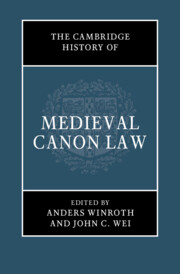Book contents
- The Cambridge History of Medieval Canon Law
- The Cambridge History of Medieval Canon Law
- Copyright page
- Contents
- Figures
- Maps
- Tables
- Contributors
- Acknowledgments
- Abbreviations
- Medieval Canon Law: Introduction
- Part I The History of Medieval Canon Law
- Part II The Sources and Dissemination of Medieval Canon Law
- Part III Doctrine and Society
- Iudicium
- Clerus
- 18 Ecclesiastical Property, Tithes, Spiritualia
- 19 The Law of Benefices
- 20 Religious Life
- 21 The Sacraments of Baptism, Confirmation, and the Eucharist
- 22 Confession, Penance, and Extreme Unction
- 23 Saints and Relics
- Conubium
- Crimen
- Conclusion
- Bibliography of Primary Sources
- Index
- References
21 - The Sacraments of Baptism, Confirmation, and the Eucharist
from Clerus
Published online by Cambridge University Press: 13 January 2022
- The Cambridge History of Medieval Canon Law
- The Cambridge History of Medieval Canon Law
- Copyright page
- Contents
- Figures
- Maps
- Tables
- Contributors
- Acknowledgments
- Abbreviations
- Medieval Canon Law: Introduction
- Part I The History of Medieval Canon Law
- Part II The Sources and Dissemination of Medieval Canon Law
- Part III Doctrine and Society
- Iudicium
- Clerus
- 18 Ecclesiastical Property, Tithes, Spiritualia
- 19 The Law of Benefices
- 20 Religious Life
- 21 The Sacraments of Baptism, Confirmation, and the Eucharist
- 22 Confession, Penance, and Extreme Unction
- 23 Saints and Relics
- Conubium
- Crimen
- Conclusion
- Bibliography of Primary Sources
- Index
- References
Summary
When Gratian’s Decretum took its final shape in the mid-twelfth century, one of its three major parts, the Tractatus de consecratione ecclesiae, focused on sacramental law. De consecratione, added in the second recension, reflects the theological climate of the time, when theologians defined seven sacraments: baptism, confirmation, penance, the Eucharist, holy orders, matrimony, and extreme unction. Previously, the sacraments had occupied only a modest place in the canon law, with exceptions like the Decretum of Burchard of Worms and the collections ascribed to Ivo of Chartres. De consecratione was divided into five distinctions, focused on churches, the Eucharist, and baptism. The text exposed students to the concept of the Real Presence of Christ in the consecrated bread and wine, reflecting the theologies of the previous century and the Gregorian Reform’s critique of simony, buying and selling spiritual gifts.
- Type
- Chapter
- Information
- The Cambridge History of Medieval Canon Law , pp. 404 - 420Publisher: Cambridge University PressPrint publication year: 2022

